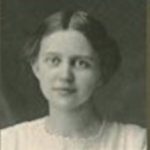 About the author: Ethel Thomas Herold (1896 — 1988). From the description of her papers in Stanford University:
About the author: Ethel Thomas Herold (1896 — 1988). From the description of her papers in Stanford University:
Ethel Thomas Herold grew up in small-town Wisconsin, married her college sweet-heart, Elmer, and both followed her brother to teach in the Philippines in 1922. There, with but a couple of brief interruptions, she spent the next thirty-seven years, including three in a Japanese internment camp during World War II. They witnessed the Philippines change from being a colony to an independent nation.
The blurb for the book Citizen of empire : Ethel Thomas Herold, an American in the Philippines, by Theresa Kaminski, University of Tennessee Press, Knoxville, 2011, further summarizes the author’s life:
As Kaminski’s narrative reveals, Ethel’s views of active patriotism began to form when her oldest brother became a schoolteacher in Philippines in 1901 after the Spanish-American War. After college and marriage, Ethel and her husband Elmer Herold went to the islands to teach in the public schools, a way to spread American ideals abroad. She quit teaching in 1927 to start a family but continued to support U.S. imperialism through her colonial household and club work. Her comfortable expatriate life fell apart when Japanese attacked the Philippines in 1941: the colonial elite were now powerless prisoners. After the war, wishing to help the people who had supported them during the occupation, Ethel and Elmer Herold stayed in the islands, but after Philippine independence came in 1946, they found themselves strangers. In 1959 the couple returned to Wisconsin, where Ethel remained politically active and saw the solution to America’s Cold War problems in conservative wing of Republican Party. Ethel Thomas Herold’s forceful personality, marked notably by her strongly held views on patriotism and citizenship, her transpacific life offers a remarkable instance of how personal and political came together during the “American century.”
About the diary: Typescript, “World War II diary : December 7, 1941 to May 9, 1945,” in the Ethel Thomas Herold papers, Stanford University. A copy is also in the Roderick Hall Collection, Filipinas Heritage Library.
The Philippine Diary Project is grateful to author James Scott for suggesting inclusion of this diary.